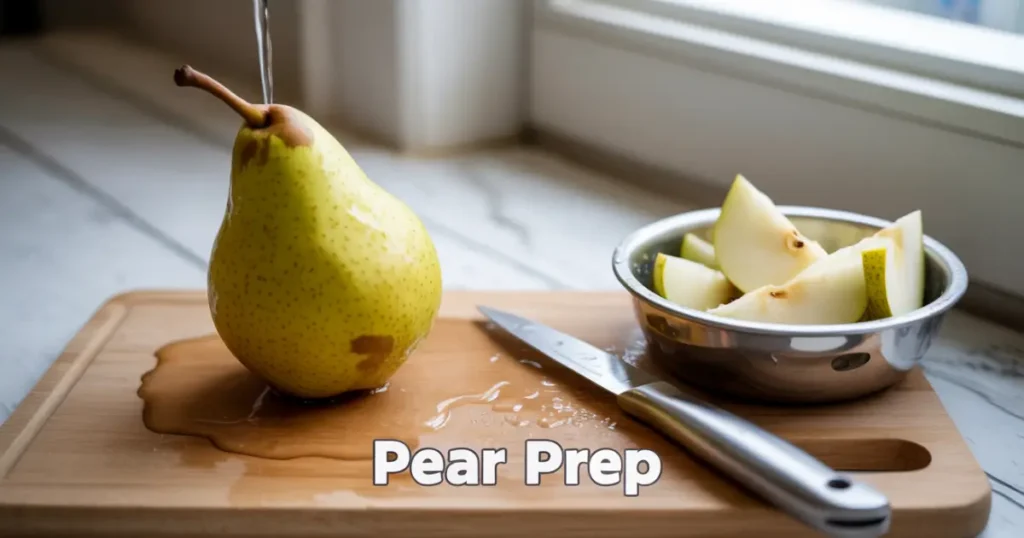Can Dogs Eat Pears: 8 Amazing Benefits & Safe Serving Guide
If you’ve ever enjoyed a juicy pear and noticed your four-legged friend giving you those hopeful eyes, you might wonder: Can dogs eat pears? The good news is that, when prepared correctly and given sparingly, pears are generally safe and healthy for dogs. “Can dogs eat pears?” is a question that many pet owners have because they want to give their dogs healthy treats. This comprehensive guide explores everything you need to know about feeding pears to your dog, from the nutritional benefits to proper preparation techniques.
Table of Contents
Are Pears Safe for Dogs?
Yes, dogs can safely eat the flesh of ripe pears. When pet owners ask, “Can dogs eat pears?” They can rest easy knowing that pears are safe for dogs and can be a healthy treat. However, like any human food given to pets, there are important considerations to keep in mind.
Not every part of the fruit is suitable for canine consumption, even though the meaty portion of pears is safe. The seeds, stems, and leaves contain trace amounts of cyanide compounds that can be harmful if consumed in large quantities. The core may also pose a choking hazard. Therefore, when considering whether can dog eat pear safely, proper preparation is essential.
8 Incredible Health Benefits of Pears for Dogs
When dog owners ask, “Can a dog eat pears?” they’ll be pleased to learn about the numerous health benefits these fruits offer. Here are eight ways pears can contribute positively to your dog’s health:
1. Excellent Source of Fiber
Pears contain soluble and insoluble fiber that can support digestive health in dogs. This fiber can help:
- Regulate bowel movements
- Alleviate mild constipation
- Support a healthy gut microbiome
- Create a feeling of fullness, which may help with weight management
For dogs with occasional digestive issues, the gentle fiber in pears can be particularly beneficial.
2. Rich in Essential Vitamins
When dogs eat pears, they benefit from several important vitamins:
- Vitamin C: As an antioxidant and immune system booster
- Vitamin K: Essential for healthy bones and appropriate blood coagulation
- Vitamin A: Promotes healthy vision, immune function, and cell growth
- B vitamins: Support energy metabolism and nervous system function
These vitamins contribute to your dog’s overall well-being and can complement their regular diet.
3. Valuable Mineral Content
Pears provide several minerals that support canine health:
- Copper: Essential for red blood cell formation and immune function
- Potassium: Supports heart and muscle function
- Magnesium: Important for muscle and nerve function
- Manganese: Supports enzyme functions and bone development
When people ask, “Can dogs eat pears?” these nutritional benefits make it clear why they can be a healthy addition to a dog’s diet.
4. Low in Calories and Fat
Due to their low calorie and fat content, pears are a great treat for:
- Dogs on weight management programs
- Less active or senior dogs
- Dogs that need frequent rewards during training
When considering whether can dog eat pears as part of a weight management plan, they can be a better alternative to many commercial treats.
5. High Water Content
With approximately 84% water content, pears can help contribute to your dog’s daily hydration needs. This is especially beneficial for:
- Dogs in hot weather
- Dogs that don’t drink enough water voluntarily
- Active dogs that need additional hydration
- Senior dogs that may need support in maintaining proper hydration
Pears’ moisture content can be a cool way to increase your dog’s water consumption.
6. Natural Sweetness Without Added Sugars
Unlike many commercial dog treats that contain added sugars, pears offer natural sweetness that most dogs enjoy. This makes them:
- A healthier alternative to processed treats
- Appealing to picky eaters
- Useful for training treats without excessive calories
- Satisfying for dogs with a sweet tooth
When dog owners ask, “Can a dog eat pears?” This inherent sweetness frequently serves as a selling point.
7. Antioxidant Properties
Pears contain antioxidants that can help combat oxidative stress and inflammation in your dog’s body. These compounds may:
- Support cellular health
- Help manage inflammation
- Contribute to overall well-being
- Support healthy aging
The antioxidants in pears are particularly concentrated in the skin, though for dogs, it’s often best to remove the skin for digestibility.
8. Cooling Properties
In traditional health systems, pears are considered to have cooling properties that may be beneficial for dogs that tend to run hot or have inflammatory conditions. While this benefit is less scientifically documented, many holistic veterinarians note the potential value.
Potential Risks and Considerations
While pears can be beneficial, there are important considerations when determining if can dogs eat pear safely:
Parts to Avoid
When feeding pears to your dog, always avoid:
- Seeds: Contain trace amounts of cyanide compounds
- Core: Difficult to digest and poses a choking hazard
- Stems and leaves: Also contain cyanide compounds
- Pear pits: Found in certain varieties and can damage teeth or cause intestinal blockage
Pears should always be properly prepared before being given to your dog.
Choking Hazard
Large pieces of pear can present a choking hazard, particularly for small breeds or dogs that tend to gulp their food without chewing properly. For your dog, always cut pears into pieces of the right size.
Sugar Content
While the sugar in pears is natural, it’s still sugar. Dogs with certain health conditions, such as diabetes, obesity, or pancreatitis, may need to avoid pears or have very limited quantities. When considering whether can dog eat pear with these conditions, always consult your veterinarian first.
Digestive Upset
Some dogs may experience digestive upset when introduced to new foods, including pears. Signs to watch for include:
- Diarrhea
- Vomiting
- Gas or bloating
- Reduced appetite
If your dog experiences any of these symptoms after consuming pears, discontinue offering them and consult your veterinarian.
Allergic Reactions
Though rare, some dogs may have allergic reactions to pears. Signs of a food allergy can include:
- Itchy skin or hives
- Ear infections
- Gastrointestinal upset
- Face, lip, or eyelid swelling
If you notice any of these symptoms after your dog eats pears, discontinue feeding them immediately and consult your veterinarian.
How to Safely Prepare Pears for Dogs
When dog owners ask, “Can dogs eat pear?” the answer depends partly on proper preparation. Follow these steps to safely prepare pears for your canine companion:

Choose the Right Pears
Select ripe, fresh pears without signs of mold or rot. Organic pears are preferable to minimize pesticide exposure, but thoroughly washing conventional pears is also effective.
Proper Washing
Thoroughly wash the pear under cool running water to remove any pesticide residues, dirt, or bacteria from the surface.
Remove Hazardous Parts
Before offering pears to your dog:
- Cut the pear in half
- Remove the core completely
- Discard all seeds
- Remove the stem and any leaves
- For dogs with sensitive digestive systems, think about peeling the skin.
Cut Into Appropriate Sizes

Cut the pear into bite-sized pieces appropriate for your dog’s size to prevent choking. Smaller dogs need smaller pieces than larger breeds.
Introduce Gradually
When first determining if can dogs eat pears without issues in your specific pet, start with a small amount and monitor for any adverse reactions before offering more.
Serving Sizes and Frequency
Moderation is key when feeding pears to dogs. Here’s a guide based on dog size:

| Dog Size | Recommended Pear Serving | Frequency |
|---|---|---|
| Small (under 20 lbs) | 1-2 small pieces (1-2 teaspoons) | 1-2 times per week |
| Medium (20-50 lbs) | 2-3 pieces (1-2 tablespoons) | 1-2 times per week |
| Large (over 50 lbs) | 3-4 pieces (2-3 tablespoons) | 1-2 times per week |
Remember that treats, including fruits like pears, should make up no more than 10% of your dog’s daily caloric intake. Dog food that is complete and balanced should provide the majority of their nutrients.
Creative Ways to Serve Pears to Dogs
Pears can be added to your dog’s treat rotation in a number of ways:
Fresh Pear Pieces
The simplest way to offer pears is in fresh, bite-sized pieces. This maintains the nutritional integrity of the fruit and provides a refreshing snack.
Frozen Pear Treats
For a cooling summer treat, freeze small pieces of pear. This can be particularly soothing for teething puppies or during hot weather.
Pear Puree
For senior dogs or those with dental issues, pureeing pears can make them easier to consume. You can also use a tiny bit of pear puree as a topping for your dog’s normal food.
Mixed Fruit Treats
Combine small amounts of dog-safe fruits, such as pears, apples, and blueberries, for a varied and nutritious treat mix. When asking “Can dogs eat pear?” alongside other fruits, ensure all components are safe for canine consumption.
Pears vs. Other Fruits for Dogs
When considering whether can dogs eat pears compared to other fruits, here’s how they stack up:
| Fruit | Safety for Dogs | Notable Benefits | Considerations |
|---|---|---|---|
| Pears | Safe (flesh only) | Fiber, vitamins, low calorie | Remove seeds, core |
| Apples | Safe (flesh only) | Similar to pears, slightly more vitamin C | Remove seeds, core |
| Bananas | Safe | High in potassium, easy to digest | Higher in sugar than pears |
| Blueberries | Very safe | Antioxidant-rich, low sugar | None – one of the best fruits for dogs |
| Watermelon | Safe (flesh only) | High water content, hydrating | Remove seeds and rind |
Understanding these comparisons helps when determining what fruits can best benefit your specific dog’s needs.
Pears offer moderate sugar content compared to dates, which contain significantly higher concentrations of natural sugars.
While pear skin can be safely consumed in moderation, watermelon rind poses more significant digestive challenges for most dogs.
Most dogs can tolerate the moderate flavor of pears, but some dogs may find citrus fruits, such as mandarins, to be too acidic.
Persimmons present greater hazards than pears, particularly due to their seeds, which can form dangerous digestive obstructions.
When to Avoid Giving Pears to Dogs
While many dogs can safely enjoy pears, there are circumstances when they should be avoided:
Health Conditions
Dogs with these conditions may need to avoid pears:
- Diabetes: Due to the natural sugar content
- Pancreatitis: The sugar content may trigger inflammation
- History of bladder stones: Some types of stones can be aggravated by certain fruits
- Gastrointestinal sensitivities: Some dogs simply don’t tolerate fruits well
During Dietary Transitions
Avoid introducing pears during times of:
- Switching to a new dog food
- Recovery from gastrointestinal upset
- Following surgical procedures
- When starting new medications that might interact with food
Signs Your Dog Should Not Eat Pears
If your dog exhibits any of these responses to pears, discontinue offering them:
- Consistent digestive upset after consumption
- Signs of an allergic reaction
- Behavior changes after eating pears
- Any concerning symptoms that correlate with pear consumption
Always prioritize your dog’s specific health needs over general guidelines.
Key Takeaways About Pears for Dogs
- Can dogs eat pears? Yes, the flesh is safe and nutritious when properly prepared
- Can dog eat pear seeds or cores? No, these parts should always be removed
- Can dogs eat pear in moderation? Yes, small amounts, 1-2 times weekly, are appropriate
- Can a dog eat pears for health benefits? Pears do provide hydration, fiber, vitamins, and minerals.
- Always remove seeds, core, stems, and consider removing the skin
- Cut into appropriate sizes based on your dog’s size to prevent choking
- Introduce gradually and monitor for adverse reactions
- If your dog has any particular health issues, speak with your veterinarian.
Conclusion
So, can dogs eat pears? The answer is a qualified yes—pears can be a healthy, nutritious treat for most dogs when properly prepared and offered in moderation. The flesh of pears provides valuable nutrients, fiber, and hydration that can complement your dog’s regular diet.
When dog owners ask, “Can dog eat pears?” they should focus on proper preparation—always removing seeds, core, and stems before cutting the fruit into appropriate-sized pieces for their pet. The safest way to introduce any new food, including pears, is to start with small amounts and keep an eye out for any negative reactions.
Keep in mind that the inquiry, “can a dog eat pears?” can generally be answered affirmatively, each dog is an individual with unique nutritional needs and potential sensitivities. What is ideal for one dog might not be for another. Always consult with your veterinarian about specific dietary questions, especially if your dog has health conditions that might be affected by treats like pears.
By following the guidelines outlined in this article, you can safely share this nutritious fruit with your canine companion and add some healthy variety to their treat rotation.
Frequently Asked Questions
Can puppies eat pears?
Yes, puppies can eat small amounts of pears, but with extra caution. Their digestive systems are more sensitive than adult dogs, so introduce very small pieces (about the size of a pea) and monitor closely for any adverse reactions. Pears should not be a significant part of a puppy’s diet, as they need specialized nutrition for proper growth and development.
What should I do if my dog accidentally eats pear seeds?
If your dog consumes a few pear seeds, monitor them closely but don’t panic. A small number of seeds is unlikely to cause significant harm due to the minimal amount of cyanide compounds present. However, if your dog consumes many seeds or shows symptoms like excessive drooling, difficulty breathing, dilated pupils, or unusual behavior, contact your veterinarian immediately.
Can dogs with diabetes eat pears?
Dogs with diabetes should generally avoid pears or have them in very limited quantities due to the natural sugar content. Before giving any fruit, including pears, to a dog with diabetes, always get advice from your veterinarian. If allowed, the portion size would typically be smaller than for healthy dogs.
Are canned pears safe for dogs?
Dogs shouldn’t eat canned pears because they usually contain added sugars and preservatives. If you must use canned pears, choose varieties packed in water with no added sugars or artificial sweeteners. Rinse thoroughly before serving to remove any syrup. For dogs, fresh pears are always the healthier option.
Can pears help with my dog’s constipation?
The fiber in pears may help with mild, occasional constipation in dogs. However, if your dog is regularly constipated or showing signs of discomfort, consult with your veterinarian rather than relying on home remedies. Chronic constipation can be a sign of underlying health issues that require proper veterinary attention.







